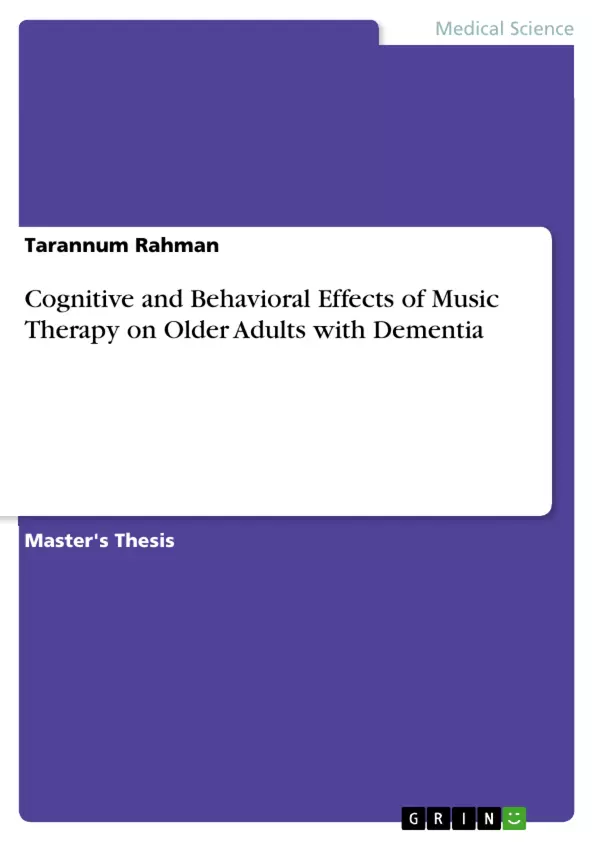The aim of this research is to measure/identify cognitive, behavioural and psychological effects of music therapy on older adults with dementia. 47.5 million people are affected with age-related neuro-cognitive and behavioural disorder named as Dementia, and 1.9 million people have died due to this disease according to the world health report of 2015 whereas 7.7 million new cases are occurring every year. One in four people aged 85 and over will have different forms of dementia by the end of the year 2050. However, in the year of 2013, this fatal psychological disease lead to 1.7 million annual deaths, whereas in 1990; there were only 0.8 million deaths per annum due to dementia; which indicates that the rate of affected patients and case fatality rate are increasing gradually.
Music therapy is a quick form of non-pharmacological, non-invasive intervention for the rising number of demented patients besides the medical as well as pharmacological intervention. Because these traditional interventions have proven their ineffectiveness and handled to side effects of medicine in demented patients. Nationwide, about 10% of the population, develop dementia at some point in their lives. It is a common form of brain defects which occur due to the ageing process and genetic abnormalities. Approximately half of the entire dementia population is over 85 years old and over. 3% individuals aged between 65–74 years have dementia in 2016; whereas 19% people with this disease aged between 75 - 84 years, which indicates that the percentage of individuals who are getting dementia is proportionate to the gradual increase of their age.
By the blessings of modern medicine where more people are living longer, dementia is becoming more and more common in the population which overrides the percentage of cardiac illness, hypertension and other neurological age-related problems. Furthermore, for individuals with a younger age group, dementia is less frequent in the developing countries. Due to decrease risk factors and caring environment for the elderly persons, more carer within the family, family values and morals; dementia has not taken it tolls in countries like Bangladesh. Dementia is an excellent cause of disability among the old in various parts of the world. This fatal disease has increased the economic burden by which costs of care increases by USD 604 billion a year worldwide in 2010.
Inhaltsverzeichnis (Table of Contents)
- 1. INTRODUCTION
- DESCRIPTION OF THE CONDITION
- DESCRIPTION OF INTERVENTION
- JUSTIFICATION
- 2. LITERATURE REVIEW
- Epidemiology of dementia..
- Concept of Dementia with older adults.....
- Impact of music therapy on cognitive functions of older adult patients with dementia......
- 3. METHODOLOGY
- METHODS
- SEARCH STRATEGY:
- Aims and objectives
Zielsetzung und Themenschwerpunkte (Objectives and Key Themes)
This systematic review aims to examine the cognitive and behavioral effects of music therapy on older adults with dementia. The study investigates the impact of music therapy interventions on various aspects of cognitive function and behavior in this population.
- The impact of music therapy on cognitive function in older adults with dementia.
- The effect of music therapy on behavioral symptoms in individuals with dementia.
- The potential benefits of music therapy as a complementary intervention for dementia care.
- The effectiveness of different music therapy approaches in improving cognitive and behavioral outcomes.
- The methodological considerations and challenges associated with research on music therapy for dementia.
Zusammenfassung der Kapitel (Chapter Summaries)
- Chapter 1: Introduction: This chapter provides an overview of dementia, describes the intervention of music therapy, and justifies the research undertaken in the systematic review.
- Chapter 2: Literature Review: This chapter delves into the existing research on dementia, particularly its prevalence and impact on older adults. It also explores the potential benefits of music therapy in improving cognitive function and managing behavioral symptoms associated with dementia.
- Chapter 3: Methodology: This chapter outlines the methods employed in the systematic review, including the search strategy, inclusion and exclusion criteria, and data extraction procedures. It also details the aims and objectives of the study.
Schlüsselwörter (Keywords)
The systematic review focuses on key terms such as Randomized Control Trials (RCTs), Dementia, Cognitive, Behavioural Therapy, Psychological Symptoms, Music Therapy, Clinical Trials, Quality of Life, Treatment Outcomes, Single-Blind Studies, Nursing Home Patients, REVMAN Analysis, Aged, 80 and Over, Aged, Male, Female, Geriatric Depression Scale, Questionnaires, Clinical Assessment Tools, Psychological Tests, Scales, and Interview Guides.
Frequently Asked Questions
What is the main goal of music therapy for dementia patients?
The goal is to provide a non-pharmacological and non-invasive intervention to improve cognitive function, manage psychological symptoms, and enhance the quality of life for older adults with dementia.
How common is dementia in older populations?
Dementia affects approximately 10% of the population at some point. Its prevalence increases with age, affecting about 19% of people aged 75-84 and 25% of those aged 85 and over.
Why is music therapy considered a better alternative to some medications?
Traditional pharmacological interventions often have side effects and may be ineffective for certain behavioral symptoms. Music therapy offers a safe, side-effect-free way to stimulate memory and emotional response.
What are the psychological effects of music therapy?
It can reduce depression, anxiety, and agitation while improving social interaction and emotional well-being in patients residing in nursing homes or home care.
What methodology was used in this research?
The study is a systematic review that analyzes Randomized Control Trials (RCTs) and clinical trials, using tools like REVMAN analysis and the Geriatric Depression Scale.
What is the economic impact of dementia worldwide?
Dementia places a significant economic burden on society, with global care costs estimated at approximately USD 604 billion annually as of 2010.
- Citar trabajo
- Tarannum Rahman (Autor), 2017, Cognitive and Behavioral Effects of Music Therapy on Older Adults with Dementia, Múnich, GRIN Verlag, https://www.grin.com/document/538444



